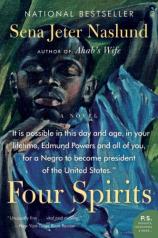Four Spirits
Review
Four Spirits
Sena Jeter Naslund dedicates her new novel, FOUR SPIRITS, to the memories of Addie Mae Collins, Denise McNair, Carole Robertson, and Cynthia Wesley. While these names may not seem immediately familiar, they are important: to quote Naslund's dedication, these four girls were "killed Sunday, September 15, 1963, in the racist bombing of Sixteenth Street Baptist Church, Birmingham, Alabama, as they prepared to participate in a Youth Worship Service."
Such a dedication is appropriate, given that FOUR SPIRITS recounts that bombing and the civil rights demonstrations of that year. On the same page, however, Naslund includes a verse of the old Sunday school hymn, "Jesus Loves the Little Children," and what had been a heartfelt acknowledgment of her muse becomes embarrassingly sanctimonious, a warning that Naslund may oversimplify the astoundingly complicated race issue in the pages that follow. It raises the expectation --- and the fear --- that her black characters will be courageous and spiritual, free of all hate and malice, while the white people will be shallow and unbelieving, perhaps evil.
Then again, Naslund, a Birmingham native, is a white author writing about a black cause, which carries a whiff of appropriation. Furthermore, she writes from the points of view of several black characters. So at the outset, whatever sanctimony creeps into the novel is leavened by the tightrope nature of the project itself: if her black characters were to feel false or one-dimensional, then the message as well as the drama suffers. To her credit, Naslund seems aware of the received opinions and easy truths regarding this period in local and national history, and she manages to dig deeper and uncover startling and original insights about race, class and social upheaval.
With a large cast of characters representing the spectrum of the city's population, FOUR SPIRITS is appropriately epic: its scope feels wide enough to capture the dramatic social and political revolution represented not only by these four girls, but also by Martin Luther King Jr.'s nonviolence movement. Naslund writes in many black points of view, including those of Reverend Fred Shuttlesworth, the preacher who organized the city's grassroots demonstrations long before King took center stage; Christine Taylor, a mother of three and a night school teacher; and her friend Gloria, a cello player who is cripplingly shy.
However, the novel's most intriguing and unpredictable black character is TJ, a hotel clerk, adoring husband, and veteran of the Korean War. Because his strongest and most immediate reaction to the racial injustice around him is violence, he is drawn to King's message of nonviolence: "he had to get into the heart of that idea before he killed somebody again. Killed somebody in his own country."
On the opposite side of the race fence is Ryder Jones, a white gas station attendant whose poverty feeds his racist fervor. Not only is he an active Klansman who despises Jews and Catholics as well as blacks, he emotionally and physically abuses his wife Lee, who becomes increasingly defiant as she realizes the depths of his hatred.
Not all of Naslund's white characters are so compromised. In fact, the novel's most intricately drawn and compelling character is a twenty-year-old orphan named Stella Silver, a philosophy student at Birmingham Southern University. Her strong reactions to local and national tragedies, and her efforts to define herself, give the novel an emotional heft that rivals its scope.
Naslund accommodates this large cast through short chapters, which range from a few paragraphs to a few pages. She makes good use of the limited space, painting her characters in focused, concise brushstrokes, but the many cutaways are jarring and abrupt, detracting from the drama rather than intensifying it. For example, when the Sixteenth Street Baptist Church explodes, Naslund recounts it from several shifting points of view, which lessens the event's immediacy and horror.
FOUR SPIRITS is at its best when it follows a character around for hours and pages, when it lingers long enough to capture a range of emotions. It's highly revealing that the novel's strongest chapter --- which recounts almost moment by moment the day when Stella learns of President Kennedy's assassination --- is also one of its longest.
On the other hand, these short, fast chapters allow Naslund to strike a fine balance between white and black perspectives and fashion an integrated novel. For her and her characters, the civil rights movement is neither a black story nor a white story --- it is both --- and as such it is endlessly complicated. Naslund courageously tries to capture the era's complexity and honor the magnitude of these events. That she is not entirely successful does not diminish the nobleness of the undertaking.
Though flawed, FOUR SPIRITS is an act of empathy, which is the heart of all literary endeavors.
Reviewed by Stephen M. Deusner on January 22, 2011
Four Spirits
- Publication Date: September 1, 2004
- Genres: Fiction
- Paperback: 560 pages
- Publisher: Harper Perennial
- ISBN-10: 006093669X
- ISBN-13: 9780060936693










